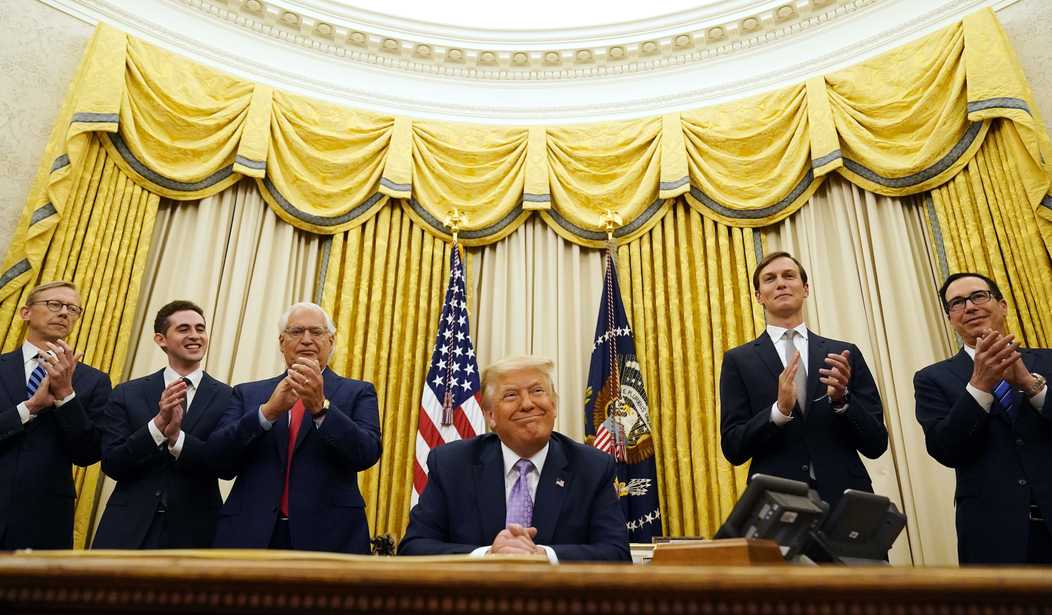On September 15, Israel, the United Arab Emirates, and Bahrain signed a U.S.-sponsored deal in Washington on normalizing relations between Israel and the two Arab Gulf states.
Since then things have been moving fast. On Sunday, at a ceremony in Bahrain’s capital of Manama, Israel and Bahrain inked an agreement formally establishing diplomatic ties between them. It was accompanied by memoranda on cooperation in a wide range of fields from aviation to agriculture. The U.S. was represented by Treasury Secretary Steven Mnuchin, who called the signings “a remarkable accomplishment.”
Things are moving forward with the UAE as well. Also on Sunday, Israel and the UAE agreed to enable 28 weekly flights between Tel Aviv and Abu Dhabi. Calling it “one of the first, important fruits of the peace agreement,” Israel’s Transportation Ministry said the flights would smooth the way to “tourism, trade, and business between the countries.”
It’s all a far cry from the days of the “Arab-Israeli conflict,” when the Arab states were perceived — not entirely accurately, but considerably so — as a united bloc of hostility toward Israel.
With the Trump administration claiming it’s hard at work on further normalization deals between Israel and Arab countries, speculation centers on which of those countries may be next.
Last week in a Zoom call with Israelis, a group of Sudanese pro-normalization activists claimed the Sudanese public was “largely in favor of ties with Israel.” One of the activists said young people, no longer restricted to government propaganda, had been “get[ting] their news from alternative sources and have been seeing the true face of Israel for a long time” — meaning an attractive picture of a democratic, technologically advanced country in the heart of the Middle East.
There’s also opposition in Sudan to mending fences with Israel, particularly from civilian leader Prime Minister Abadalla Hamdok. On that issue, he’s at loggerheads with military leader Abdel Fattah al-Burhan, who met publicly with Israeli prime minister Benjamin Netanyahu back in February. Meanwhile, Washington has been pressuring Khartoum to move forward and follow the examples of the UAE and Bahrain.
Saudi Arabia, however, with its centrality and influence in the Arab world, is considered the big prize. Even there, what would have been dismissed as a pipedream not so many years ago may be materializing.
On September 4, Abdul Rahman al-Sudais, imam of the Grand Mosque in Mecca, gave a sermon highlighting Muhammad’s friendly relations (that is, in some episodes) with Jews. Considering that in past sermons Sudais had called Jews “killers of prophets and the scum of the earth,” he may well not have had a sudden change of heart. Many believe, though, that he was carrying out a directive from Riyadh to help prepare Saudi public opinion for a big change in Saudi Arabia’s public stance toward Israel.
The Saudis are, indeed, for the first time allowing Israeli commercial flights to cross their airspace, and the Washington Post reports on a new, more positive tone on Israel in the Saudi media.
This is not, of course, a love affair between Israel and the Arab world. Although one recent survey found solid majorities of Saudis, Jordanians, Egyptians, and Emiratis (but not, predictably, Palestinians) in favor of Israel’s deals with the UAE and Bahrain, another, much wider survey found large majorities in twelve Arab countries and the Palestinian Authority still opposing recognition of Israel.
Even so, the Trump administration’s efforts — based on a sound reading of Israel and Arab states’ common interests in resisting Iran and common weariness with the intractable Palestinian issue, as well as winds of moderation in at least parts of the Arab world — are producing positive results and a positive trend. It will be too bad if a new administration in Washington goes back to a grim, pointless obsession with the Palestinian issue and a renewed pampering of Tehran. But even in that dark scenario, Israel and its open or tacit Arab partners will have no choice but to draw closer.
P. David Hornik, a longtime American immigrant in Israel, is a freelance writer, translator, and copyeditor living in Beersheva. In addition to PJ Media his work has appeared in National Review, American Spectator, Frontpage Magazine, New English Review, American Thinker, The Times of Israel, the Jerusalem Post, and elsewhere. Among his books are Choosing Life in Israel and, newly released by Adelaide Books, the novel And Both Shall Row.









Join the conversation as a VIP Member